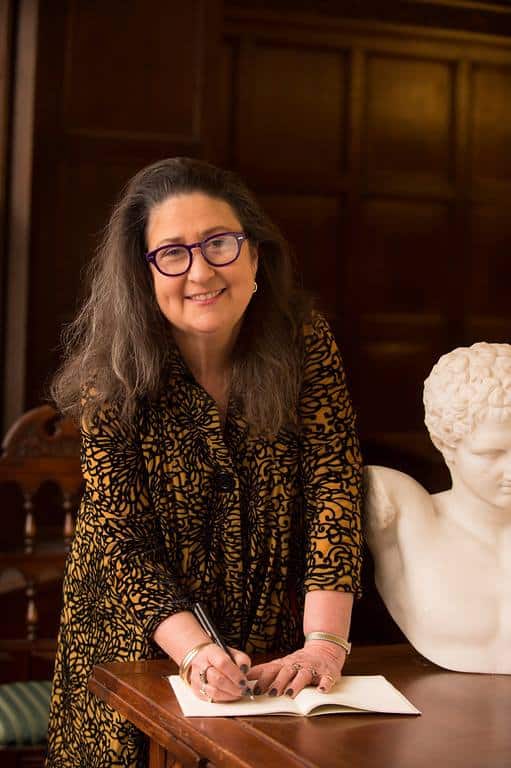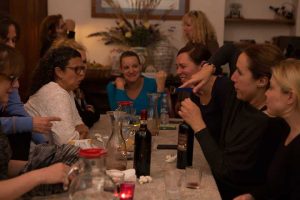By Ann Klotz
My husband and I are lying on the bed, warm October sun slanting through the window, an afternoon nap.
It has been a week, starting on Tuesday morning with a 5:30 a.m. phone call, announcing the unexpectedly swift death of a teacher we all love. Loretta had worked at Laurel with me, teaching English, then leaving to have Margaret, and then baby Tommy. Her cancer was discovered when Tommy was weeks old. Her battle is swift, virulent, hopeless. Fifteen months from diagnosis till death. Last week, she and I had had an email exchange about fruit flies. She, awake in the wee hours of the night, offered me remedies; I, astonished that in the middle of her fight to live to mother her children, she is generous enough to think of me, whining on Facebook about the infestation that grosses me out and refuses to be cured by any of the home remedies I try.
When Loretta’s best friend phones to tell me Loretta has died, I know I have to call our daughter. There, in the dark. I text her: Bad news. Phone when you can. We’d agreed earlier this fall that this would be our code. She implored me to keep her informed. She loved Loretta; they shared a sarcastic streak, and Loretta offered Cordelia a loving but unsentimental ear that helped Cordelia manage—having your mother as the head of the school you attend isn’t necessarily so easy. Cordelia babysat for Margaret, and after Loretta’s initial diagnosis, last summer, spent time with both Margaret and Tommy. It was what she could do. But, in August, when Loretta was re-diagnosed, she wasn’t strong enough to see Cordelia, and Cordelia, leaving for the semester, knew better than I that the cancer, this time, might ravage Loretta faster than we wanted to believe.
“I might not ever get to say goodbye,” she said, teary, but not crying.
“I know,” I answered softly. Too well, I know. Too many sudden losses in Cordelia’s life: it was she who stood next to me as my mother died; she, who lost a beloved friend, Jessica, in a senseless accident some years ago; she, who went to say goodbye to the mother of a friend only days before she died. Too much. Too much sorrow, too much loss.
In some sports, when there’s a tie, it’s called Sudden Death. So glib, so arch. Real death cannot be resolved with a single point, won with one shot. There is no applause, no victory cheer. Sudden death, the catalogue of deaths Cordelia has endured, is forever–grief lingering, spooling, shaping the substance of my daughter’s life, of my own life.
She phones, my cell buzzing in my hand, and I tell her. She sobs and sobs and sobs. I breathe, lonely, helpless in the dark, my husband next to me, sleeping–maybe. There is nothing to say. It isn’t fair. It’s cruel and stupid. Finally, she says, “I have to go,” and not hearing her sobs is worse than hearing them. Who is there to hug her, I wonder. Only after I hang up do I see the text I’d written yesterday: “Loretta in ICU; I don’t know if it’s time to worry.” I had never pressed send.
After Jessica died, an inner-tube on a bunny slope crashing into a pole, I stroked Cordelia’s hair as she sobbed and felt guilty that my own daughter was alive in my arms. The instant between fine and a ringing phone that announces catastrophe is knit into me, part of who I am each day; my brother died in a car accident in 1975, his death announced through the long cord of a princess phone mounted on the wall in my grandmother’s kitchen. There is always before and after.
Watching our daughters learn to drive made me breathless. “Be safe,” I implore. “Call me when you get there.” Sometimes my own anxiety, my magical thinking, “If I imagine the worst, I can prevent it” overwhelms and shames me. But it is who I am, what I know.
On highways, I am timid, remembering. Sometimes, I cannot screw up the courage to pass an eighteen-wheeler. This drives my children crazy, but I know what I can and cannot manage. I know the deals I make regularly with God. Please keep my children safe; please let my husband pull over and rest if he is too tired to drive.
Lying on the bed two weeks ago, half-napping, half-absorbed in a mystery novel, I answer my cell phone. It is Cordelia, on her way to the airport to fly home for Loretta’s funeral.
“Can you get me some pumpkin ice cream, Mom? At Mitchell’s? I haven’t had anything pumpkin all fall.” We chat for a moment and hang up. A moment later, my cell phone rings again. I can see it is Cordelia, but when I pick up, there’s no one there.
“Who was it?” asks Seth, sleepy.
“Cordelia, but she wasn’t there.”
“Butt dial,” he murmurs, and I nod, not wondering how she could butt dial from the car where she uses Blue Tooth.
And a moment later, the phone again.
“Honey,” I pick up.
Her sobs, jagged, stop me. “Mommy, Mommy, I’ve been in an accident. It’s really bad, Mom—“ Actually, I have no idea what she says because I have stopped breathing.
“Are you okay?” I squeak, imagining glass and blood and tangled limbs.
“I think so,” more tears.
“Here’s Daddy,” I thrust the phone at Seth, willing him to wake up, to calm her, to know what to do. I am floating above the room, seeing myself. “It’s happened,” I think. “I’ve lost her.” This fear that has been with me always, intensifying with each child’s birth, swallows me. It is a few minutes before I say to myself, “She’s okay, she’s okay, she’s okay,” repeating the mantra loud enough to stop the other story in my head, the one where she can’t call because she’s gone.
We switch to disaster mode, efficient, distracting. We reach our friend, Paul, who will go find Cordelia on the Sprain Brook Parkway and deliver her to LaGuardia; we book another flight, fight with United about their policies. We move forward. Late, late that night, Cordelia is in my arms. I do not want to let her loose, do not want her to absorb my fearful “might have been” state.
On Monday morning, the day is crisp, cool. Light floods the stained glass windows, which I have never noticed at the Church of the Gesu. We were here less than a year ago, invited to attend Tommy’s christening, optimistic, proud of Loretta’s courage and determination. I lean my forearms on the pew and thank God for my daughter, tears pooling beneath my closed eyes for Loretta and her family.
During the service, we mourn Loretta, my tall daughter, between her father and me. She weeps. I weep, tears leaking even when I think I am okay. We run out of the clump of Kleenex I had stuffed into my purse. Organ music always makes me cry. Loretta’s husband, brave and articulate, makes me cry. Watching others cry makes me cry. Thinking about my own mother makes me cry. How did she ever sit through her own son’s funeral without shrieking? I clasp Cordelia’s cold hand. The minister talks about the love we need to move forward from pain. So much love.
I keep score in my head. We dodged our tragedy this time. We are so lucky. Fear coils and licks, smoldering. And next time?

Ann Klotz is the Head of Laurel School, a girls’ school outside of Cleveland. Her writing has appeared in Literary Mama, Mamalode, Mothers Always Write and the Good Mother Project as well as in Independent School Magazine and on the NAIS Inspiration Blog. She blogs semi-regularly for the Huffington Post. Ann’s home is filled with books, both read and unread. She writes most often about being a mother, a teacher, and a school leader.



this was breathtaking. Literally. I held my breath through much of it. I don’t have children, but I’ve suffered primary loss (both sudden and not) and this speaks directly to the heart of the rawness. Thank you so much.
(p.s. I’m originally from Cleveland….my roots are there.)
Betsy, thank you so much for this kind comment–come visit us!
Thank you Ann for your heartbreaking and heartwarming rendering of loss and of our own battles to find meaning in life , especially for those of us left behind by those who come to mean the most to us. Sometimes it’s just their own life that gives us the reason to go on.
I can so relate. Thank you.